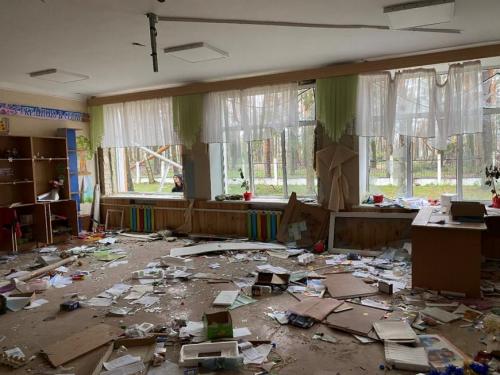Sweden: Technology Offers New Human Rights Perspectives
Postcode Lottery Donation Aids the Effort
A new investment in technology supported by the Swedish Postcode Lottery has helped document possible war crimes and serious human rights abuses in Ukraine and elsewhere, Human Rights Watch said on December 14, 2022. Digital tools are strengthening the organization’s work for accountability and long-term change in war-torn Ukraine and in other ongoing crises.

Damage from a Russian attack on School 21 on March 3, 2022, in Chernihiv city, April 19, 2022.
Thanks to generous support from the Swedish Postcode Lottery, Human Rights Watch has been able to expand its technology efforts over three years by identifying the role technology plays in human rights abuses globally and using technology and open-source research methodology to responsibly and ethically research human rights abuses.
“The support from the Swedish Postcode Lottery has enabled us to develop our technology and human rights division,” said Måns Molander, Nordic director at Human Rights Watch. “Thanks to our expanded use of technology, we have been able to strengthen our research to help in holding those responsible for human rights abuses accountable and to contribute to a more just world.”
The innovative Human Rights Watch approach has helped to document serious abuses in crises around the world, such as in Syria, Myanmar, and Ukraine, including likely war crimes. Human Rights Watch researchers have been able to identify uses of cluster munitions, attacks on hospitals and civilian infrastructure, and other possible violations of international humanitarian law in the Ukraine war. They have collected and verified this information from open sources on the internet, such as Telegram, TikTok, Instagram, and YouTube, or analysed satellite imagery.
Using open-source tools, Human Rights Watch conducts rigorous verification of the authenticity of videos of abuses spread on social media and identifies the types of weapons and ammunition used. Along with helping Human Rights Watch teams in Ukraine meticulously collect evidence, the use of open-source information counteracts disinformation by establishing the facts around the time and location of events, helping document the devastating impact that Russia’s invasion of Ukraine has had on civilians.
During the first days of the conflict, Human Rights Watch, for example, was able to document and verify an attack by Russian forces on a hospital and confirm that banned cluster munitions had been used. In Kharkiv, researchers used these techniques to help document Russia’s indiscriminate shelling of civilian buildings, including apartment blocks, schools, places of worship, and shops, killing scores of civilians in likely violations of international humanitarian law.
“Harnessing technological advances has made it possible for Human Rights Watch to go one step further to verify and document evidence to demand accountability for human rights abuses, both in Ukraine and around the world,” Molander said. “Thanks to the grant from the Postcode Lottery, the method is now also being applied in other ongoing conflicts where access is limited.
Source:Human Rights Watch
- 299 reads
Human Rights
Fostering a More Humane World: The 28th Eurasian Economic Summi

Conscience, Hope, and Action: Keys to Global Peace and Sustainability

Ringing FOWPAL’s Peace Bell for the World:Nobel Peace Prize Laureates’ Visions and Actions

Protecting the World’s Cultural Diversity for a Sustainable Future

Puppet Show I International Friendship Day 2020

